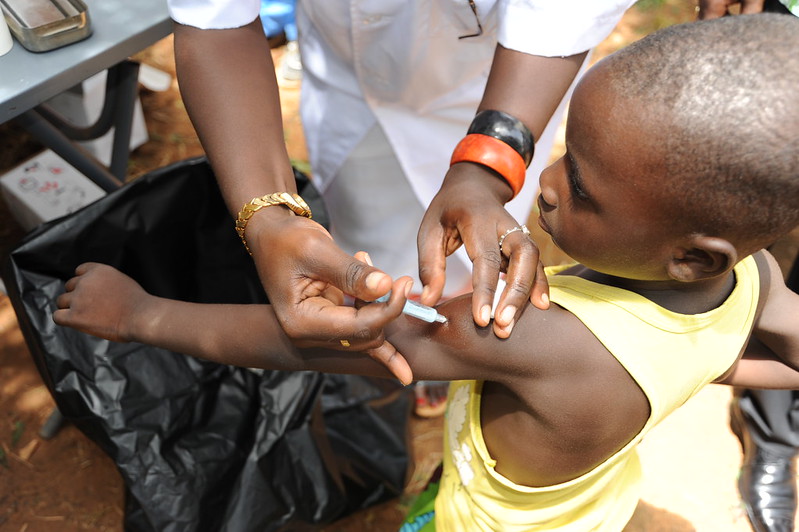The New Innovative Meningitis Vaccine in Nigeria
 Nigeria has the highest meningitis death rate among African countries. The most severe outbreaks typically occur in March and April, when intensified heat and airborne dirt contribute to the disease’s spread. To combat this, Nigeria has introduced an innovative meningitis vaccine to the public in a historic move. This vaccine promises to be more effective in eliminating meningitis and has the potential to significantly improve the lives of many Nigerians.
Nigeria has the highest meningitis death rate among African countries. The most severe outbreaks typically occur in March and April, when intensified heat and airborne dirt contribute to the disease’s spread. To combat this, Nigeria has introduced an innovative meningitis vaccine to the public in a historic move. This vaccine promises to be more effective in eliminating meningitis and has the potential to significantly improve the lives of many Nigerians.
This achievement in Nigeria aligns with the World Health Organization’s (WHO) “Defeating Meningitis by 2030: A Global Road Map.” This strategy aims to eradicate meningitis outbreaks, reduce the mortality rate from the disease and improve the well-being of those recovering from meningitis.
Meningitis
Meningitis, a fatal illness, causes swelling of the membranes around the spine and brain. Various viruses, parasites and microbes can cause this disease. Bacterial meningitis, the most severe form, can be fatal within 24 hours of infection. It currently poses a significant threat to global health. Approximately one in six individuals who contract bacterial meningitis die and one in five survivors sustain a permanent disability after treatment.
Meningitis Challenge in Nigeria
Sub-Saharan Africa is described as the African Meningitis Belt, as this area is most prone to meningitis. Approximately 30,000 diagnoses are documented in the region annually.
Nigeria, located in the African Meningitis Belt, is highly susceptible to meningitis. Reports indicate that between Oct. 1, 2023 and March 11, 2024, there were 1,742 suspected meningitis cases in Nigeria, resulting in 153 deaths and 101 confirmed cases of the disease.
Introduction of the Men5CV Vaccine
Nigeria has become the first country to implement the Men5CV vaccine to combat meningitis, effectively protecting against the five meningococcal bacteria types—A, C, W, Y and X. This vaccine is a significant improvement over its predecessor, which only offered protection against strain A.
The WHO is assisting Nigeria with the rollout of the Men5CV vaccine for meningitis, including training health providers. The organization anticipates that this vaccine will significantly reduce the rate of meningitis diagnoses and support efforts to eventually eliminate the disease, especially in countries within the African Meningitis Belt. Projections suggest extensive advertising campaigns for the Men5CV vaccine throughout the African Meningitis Belt by 2025.
The Men5CV vaccine could help Nigerians avoid falling into poverty. Treating meningitis can cost a family three to four months of income, potentially pushing them into poverty due to the financial burden. Additionally, long-term effects of meningitis, such as deafness, can make it challenging to secure employment. Therefore, the Men5CV vaccine might reduce the economic impact of treating meningitis.
Optimism For The Future
In response to Nigeria’s significant progress, world leaders will convene at a global conference in Paris in April 2024. They celebrated Nigeria’s advancements and discussed future challenges. The conference will also provide an opportunity for other world leaders to commit to accelerating efforts to eradicate meningitis as a global issue by 2030.
The introduction of the Men5CV vaccine in Nigeria marks a pivotal advance toward eradicating meningitis globally. Dr. Nanthalile Mugala, PATH’s Chief of Africa Region, stated, “The introduction of MenFive [the “Men5CV vaccine”] in Nigeria heralds a transformative era in the fight against meningococcal meningitis in Africa. Building on the legacy of previous vaccination efforts, this milestone reflects over a decade of unwavering, innovative partnerships. The promise of MenFive [the “Men5CV vaccine”] lies not just in its immediate impact but in the countless lives it stands to protect in the years to come, moving us closer to a future free from the threat of this disease.”
– James McAlinden
James is based in Rosehearty, Scotland and focuses on Global Health for The Borgen Project.
Photo: Flickr
